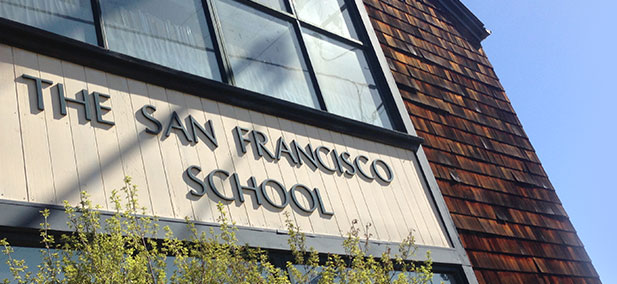Health & Wellness
Tagged with:
Featuring Toni Russell & Tiffany Fong
There are several key indicators on important aspects of children’s lives. According to the Federal Interagency Forum on Child and Family Statistics’s America’s “Children: Key National Indicators of Well-Being, 2021,” these can be categorized into domains: family and social environment, economic circumstances, health care, physical environment and safety, behavior, education, and health. Of course, many of these domains are interconnected, and furthermore, many of these involve a child’s experience at school.
Head of the Lower School Kate McElvaney recently shared coffee with SFS Health and Wellness Teachers Toni Russell and Tiffany Fong. Additionally, Toni and Coach Tiff have both served as members of the Social Emotional Learning (SEL) Task Force. Please read on to get to know them and their thoughts on Health and Wellness, SEL, and parenting at school and home.

Health & Wellness
The San Francisco School experience is not limited to academic excellence. As stated in our mission, the School “cultivates and celebrates the intellectual, imaginative, and humanitarian promise of each student.” This demands a holistic approach to child development that accounts for the whole student and includes social emotional learning as well as care for their mental and physical wellbeing.
The attention to wellness at SFS has been present for many years. It was prioritized in the School’s Strategic Plan 2017-2022: Living Our Humanitarian Promise and led to the people-focused initiative Reimagination of Time and Communication. In turn, Physical Education (PE) was renamed Health and Wellness (HW) to reflect its focus on the health of mind and body.
When Kate McElvaney joined the school last year, in mid-pandemic, the community’s wellness was a top priority for her. “I was drawn to SFS because of the strong community and attention to the whole child. Wellness is essential to the work we do, for both delivering instruction and being able to learn.” Kate wondered about the origins of the name change.
“It began in the schedule redesign committee, even before COVID,” recalls Coach Tiff. The committee to redesign the school schedule intentionally created ways to promote health and wellness as well as more joyful teaching and learning. And when the pandemic struck, “this shift in our curriculum and culture worked well during the campus closure. We as educators were concerned with a lack of connection with students, and there was heightened attention to physical and mental health. It’s like SFS had a crystal ball.”
Toni agrees, recalling the importance of holistically incorporating physical and emotional wellbeing. Since the creation of HW, she has nurtured a culture of comfort and feelings in an age appropriate way, through mindfulness, breathing, and reflection. “Health is physical, and it is mental.”
The Intersection of HW and Social Emotional Learning (SEL)
In a recent Admissions panel of SFS graduates, several students spoke about Coach Tiff’s role in their development at SFS. “They said that it wasn’t only about PE, but their connection to her as a person and an advisor. I believe that every child needs a space,” Kate muses. “Specialists [like Toni and Coach Tiff] are important because so many students are validated and comforted outside of the standard academic world.”
“HW is more about the SEL part – building confidence, being comfortable within one’s own body, cooperation and teamwork prioritized over physical gains, leadership, conflict resolution, and communication skill,” Coach says. “I try to teach them that the world isn’t always the way they want it to be, but they can manage their disappointment or frustration, and they can be resilient.”
“HW aligns with the SFS Educational Philosophy, too,” adds Kate, “which is based on challenge, collaboration, courage, compassion, and curiosity.” She sees and appreciates the way students experience physical education at SFS, with an emphasis on a growth mindset and wellness. “My PE experiences as a child were nothing like what our children get to participate in here, with the just right amount of challenge and support for their whole selves.”
“SEL used to be considered ‘soft skills’ or ‘extra,’” remarks Kate. “But now they are the essential, hard skills.” Fortuitously, the pandemic provided a space to create a HW program and fostered its acceptance by the community of teachers and families. Ironically, though COVID has brought new stressors and challenges, in some ways it facilitated the adoption of new standards, new schedules, and new realities.
Coach Tiff believes SEL is integral to the School’s vision, and she helps actualize it through HW. “I want to leave a certain legacy,” Coach Tiff says. Though many school programs may arise organically, their development and maintenance must be intentional if it is to endure. We want our culture to continue to prioritize SEL, so there has to be a structure in place for it.”
School and Home
All three educators agree that the partnership between school and home is critical. “When I first started teaching, I used to get annoyed when people asked if I have children,” laughs Kate. “But for me, once I became a parent, I had a different understanding. I could interact with parenting adults with more compassion.”
“Teaching is great professional development for parenting,” adds Toni. “I saw things in my students that I wanted to instill in my child. And the concept of compassion is huge! I want to care for these kids as if they were my own, and I want to give them the benefit of the doubt while challenging them. And I want my child to get the same love from his teachers. My wellness is closely connected to his.” She adds,”I have to do better for myself AND for him, at home AND at school.”
Coach Tiff continues, “For me, going into teaching was initially more about sports coaching than education. As an athlete, my coaches were often what my parents weren’t – we connected in a different way and they taught me things my parents didn’t. I understand that my students connect with me as I did with my coaches, and that purpose is the guiding principle of why I teach.” She sees her behavior reflected not only in her young son’s, but also in her middle school students. “I model certain values and behavior for them, because I know they see how I act or how I react to a referee’s call.”
They all concur that becoming a parent inspires them to be a better person and to present their best self to their children. And becoming a parent allows them to have more empathy for other parents. “Parenting here at SFS is easy, because I trust the school and teachers,” reflects Coach Tiff.
“I think having staff members as parents makes our school village stronger,” Kate comments. “In our school, our staff get to bring their full identity to work, this includes who they are as parents. Strong relationships are the foundation of social-emotional learning and the more our relationships are connected, the stronger our program and the healthier our community.”
Posted December 13, 2021

